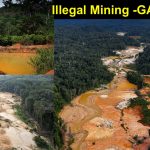World Wetlands Day is celebrated annually on February 2nd. It was first observed in 1997 and aims to raise awareness about the importance of wetlands for both the environment and humanity. The day highlights the critical roles that wetlands play, including protecting coastlines against natural disasters like storms and tsunamis. The 2025 World Wetlands Day was celebrated globally under the theme Protecting Wetlands for Our Common Future.
In Ghana, stakeholders organized a webinar to raise awareness about the importance of wetlands for climate change mitigation, Fisheries livelihoods, etc
Mr. Kyei Kwadwo Yamoah, the Executive Director of HELP Foundation Africa and also the Convenor for Fisheries Alliance and the CSOs National Platforms on SDG 14 delivered a presentation at the webinar on the topic; The Role of Wetlands in Mitigating the Impacts of Climate Change. He explained that wetlands are essential, unique, biodiverse, ecosystems. They may be saltwater or freshwater, inland or coastal, natural, or human-made, permanent, or temporary, static, or flowing. wetlands cover about 6% of the Earth’s land surface. Wetland ecosystems provide vital services that sustain us, from filtering water to supporting livelihoods, wetland flora are vital to both adaptation and mitigation. He also explained that:
- Wetlands with healthy freshwater ecosystems are critical to mitigating and adapting to climate change, they are therefore the foundation for a water-resilient future.
- Terrestrial Wetlands (Peatlands) are the world’s largest terrestrial carbon store, while river sediment deposited on the sea floor can also sequester large quantities of carbon.
- Connected floodplains and healthy wetlands can reduce the impact of extreme floods and build resilience to ever increasing droughts.
- Mangroves help protect coastal communities from storm surges. Densely populated and agriculturally rich deltas also rely on the flow of water, nutrients and sediments down rivers to limit saltwater intrusion, remain fertile, and stay above the rising seas.
He concluded that wetlands are so central to the water cycle that a world without wetlands would be a world without freshwater.







